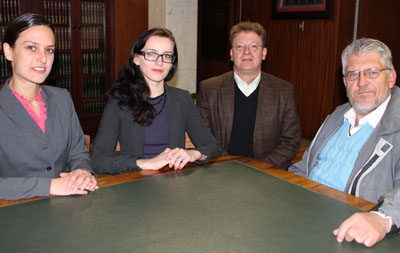 |
At the event were, from the left: Elizabeth Oklevitch, Ewelina Ochab, Prof. Shaun de Freitas and Prof. Andries Raath, also from the Department of Constitutional Law and Philosophy of Law.
Photo: Leonie Bolleurs
1 August 2012 |
Two students from abroad, Elizabeth Oklevitch, studying at the Regent University School of Law, Virginia Beach in the US, and Ewelina Ochab, a postgraduate student with a Diploma in Law who received her LLB from the University of Kent at Canterbury, have each delivered a 15-minute presentation at the Faculty of Law. These presentations are part of the six-week practical leg of the Blackstone Legal Fellowship Programme, held annually in Phoenix, Arizona.
This is the fourth consecutive year that the Faculty of Law has been involved in this initiative.
Oklevitch spoke on the impact of the natural law grounding of Sir William Blackstone’s system of rights and Ochab about the margin of appreciation in the case A, B and C v Ireland.
According to Prof. Shaun de Freitas from the Department of Constitutional Law and Philosophy of Law, the programme is aimed at teaching law students the importance of religious freedoms and rights. The programme is run by Alliance Defending Freedoms (ADF) in the US.
“The programme (in its 14th year) accommodates more than 130 students at the moment, representing schools of law in the United States (which include the universities of Duke, Harvard, Notre Dame, New York and Yale) and Europe. To date, approximately 1 100 students have completed the programme,” said Prof. De Freitas.